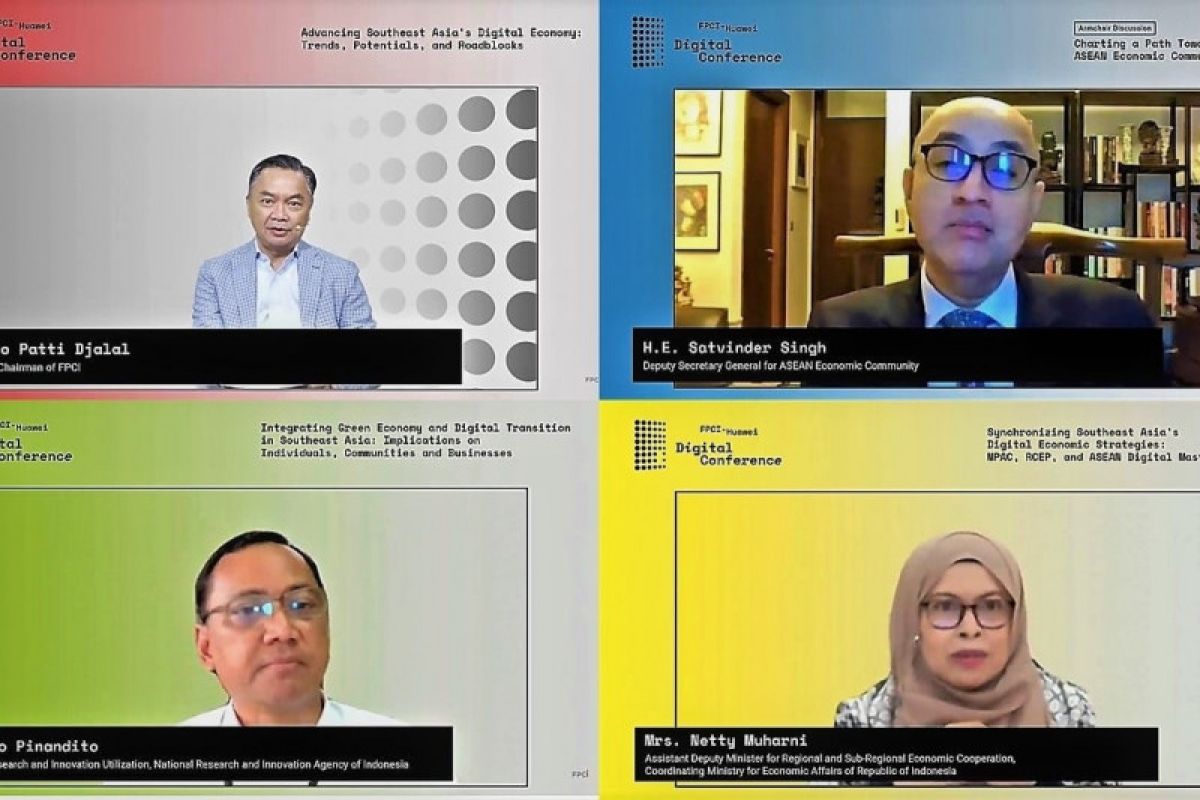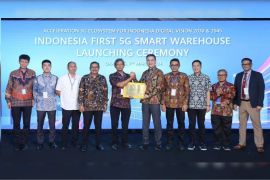The conference was attended by Founder and Chairman of FPCI Dr. Dino Patti Djalal, Vice President of Huawei Asia Pacific Jay Chen, Minister of Foreign Affairs of Malaysia Dato’ Saifuddin Abdullah, and Deputy Secretary General for ASEAN Economic Community H.E. Satvinder Singh. The conference recorded more than 1,100 registrants from Southeast Asian countries and also those from the United Kingdom, Bangladesh, Australia, India, Serbia, the United States, Liberia, and Pakistan.
In his opening remark, Founder and Chairman of FPCI Dr. Dino Patti Djalal highlighted the significant growth rate in digital economy in post-pandemic scenario, pointing out the region’s online spending to US$174 billion this year, compared to $100 billion in 2020, on its fast track to reach $363 billion by 2025 on the back of rapidly growing internet penetration and digital deals
across the region.
“We can see from these numbers that has been really remarkable growth of digital economy in Southeast Asia. This FPCI and Huawei discussion aims to have an inclusive discussions between Southeast Asian and Chinese policy makers and experts on the state of digital economy and where they go in the future,” Dino asserted.
In support of the ASEAN digital economy growth, Vice President of Huawei Asia Pacific Jay Chen emphasized Huawei’s long-term commitment to the region’s critical communication services, digital services combining connectivity and cloud to accelerate economic recovery, as part of digital push towards more integrated economy, especially to a greener and sustainable ASEAN.
“We are now at a unique time in history when our ability to build the world of tomorrow aligns with our ability to make the journey more green and sustainable. By combining the power of new ICT like digital connectivity, cloud and artificial intelligence, we can integrate the green economy and digital transformation for the sustainable development in ASEAN. With the ASEAN Economic community vision 2025 as the course, we can come together to help synchronize the strategies
of ASEAN Digital Masterplan 2025 and chart a path towards an ideal ASEAN economic community, and a resilient digital society for individuals, communities and businesses.”
Speaking of the ASEAN Digital Masterplan, Secretary General for ASEAN Economic Community H.E. Satvinder Singh said that the region had reached the halfway mark of the plan, with 55% of all the initiatives that are supposed to be completed by 2025 already achieved by the middle of this year, leaving 35% initiatives in progression and the rest of 10% to get them fully working. He added, “The ASEAN economic community is basically the vision to develop integrated and highly cohesive economic region for all of us and countries where the hope is there, everything ranging from goods, services, investment, even capital and even skill labor can move seamlessly throughout our region.”
Satvinder Singh commended Huawei and ASEAN collaboration, especially through the ASEAN Seeds for the Future program. “We hope the focus can be further expanded with the rest of ASEAN member states.”
Voicing similar recognition to Huawei’s contribution, Deputy for Research and Innovation Utilization at the National Research and Innovation Agency (BRIN) of the Republic of Indonesia, Dr. Mego Pinandito lauded, “I would like to thank Huawei for the wonderful collaboration that we have and also for inviting us [BRIN] to this conference. Technology is very important to support sustainable economies, inclusive and equitable growth, socio-economic and environmental resilience. This includes the health and productive ecosystem and reducing greenhouse gas emissions.”
The FPCI-Huawei conference highlighted three main relevant topic discussions on (1) Charting A Path Towards an Ideal ASEAN Economic Community, (2) Synchronizing Southeast Asia’s Digital Economic Strategies: MPAC, RCEP, and ASEAN Digital Masterplan 2025, and (3) Integrating Green Economy and Digital Transition in Southeast Asia: Implications on Individuals, Communities and Businesses.
The conference also brought together high-caliber speakers from government officials, private sector, and experts, including, Minister of State for the Ministry of Trade and Industry and Ministry of Culture, Community and Youth of Singapore Low Yen Ling, Assistant Deputy
Minister for Regional and Sub-Regional Economic Cooperation at Coordinating Ministry for Economic Affairs of Republic of Indonesia Netty Muharni, Senior Economist at Southeast Asia Regional Department of Asian Development Bank James Villafuerte , Head of Data Science and Advanced Analytics Bukalapak Andramica Priastyo, President of Strategy Marketing Department of Huawei Asia Pacific Region David Lu, Deputy for Research and Innovation Utilization at the National Research and Innovation Agency Dr. Mego Pinandito, Director Department for General Economic Issues and Integration Studies at Central Institute for Economic Management of Vietnam Nguyen Anh Duong, and Group Chief Executive Officer and Co-Founder of SKALI Tengku Farith Rithauddeen.
Reporter: PR Wire
Editor: PR Wire
Copyright © ANTARA 2021












